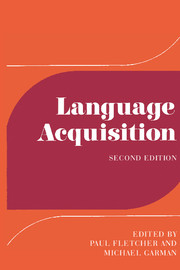Book contents
- Frontmatter
- Contents
- Contributors
- Preface
- Part I Contexts and determinants
- Introduction
- 1 Psychosocial aspects of language acquisition
- 2 Language acquisition and cognition
- 3 Language acquisition and linguistic theory
- 4 Conversations with children
- 5 Learnability
- 6 Variation in child language
- Part II The development of linguistic systems: phonology
- Part III The development of linguistic systems: grammar
- Part IV Later language development
- Notes to chapters
- Bibliography and citation index
- General index
- Titles in the series
5 - Learnability
Published online by Cambridge University Press: 05 June 2012
- Frontmatter
- Contents
- Contributors
- Preface
- Part I Contexts and determinants
- Introduction
- 1 Psychosocial aspects of language acquisition
- 2 Language acquisition and cognition
- 3 Language acquisition and linguistic theory
- 4 Conversations with children
- 5 Learnability
- 6 Variation in child language
- Part II The development of linguistic systems: phonology
- Part III The development of linguistic systems: grammar
- Part IV Later language development
- Notes to chapters
- Bibliography and citation index
- General index
- Titles in the series
Summary
Introduction
The publication of Wexler and Culicover's Formal principles of language acquisition (1980) signified the arrival of learnability theory as a central concern for those interested in constructing explanatory theories of language development. Before this, Wexler and his associates had produced a series of papers (Hamburger and Wexler 1975; Wexler, Culicover and Hamburger 1975; Culicover and Wexler 1977) which, while demonstrating the feasibility of the formal study of language learning, had conclusions which were hardly arresting for the student of child language. Since 1980 learnability has been located firmly at the centre of a constellation of related concepts which has come to dominate much discussion in linguistics and language acquisition. This constellation includes the logical problem of language acquisition, the nature of the data available to the learner, restrictiveness in linguistic theory and parameter setting and markedness. One purpose of this chapter is to map out this area of enquiry, drawing attention to some of the major conclusions and, more importantly, methods of argumentation. This involves construing learnability broadly, so as to encompass considerations which do not arise in the context of a fully formalized theory. Additionally, in the final section of the chapter I shall discuss what seem to me to be the most serious reservations about the significance of the achievements of learnability theory for the traditional study of first language acquisition.
- Type
- Chapter
- Information
- Language AcquisitionStudies in First Language Development, pp. 90 - 108Publisher: Cambridge University PressPrint publication year: 1986
- 1
- Cited by



